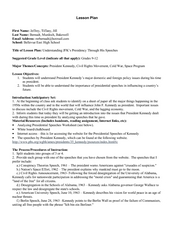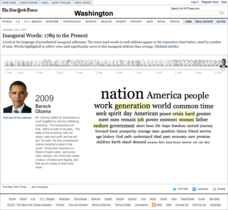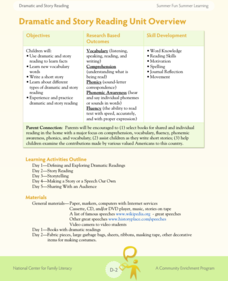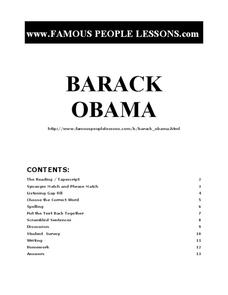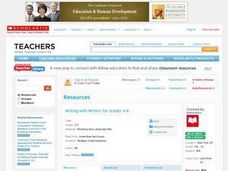Curated OER
Understanding JFK's Presidency through his Speeches
Students reflect and discuss the major events that happened in the United States in the 1950's and 1960's. In this U.S. History lesson, students read and analyze the famous speeches during this time frame, then complete a worksheet that...
University of California
The Civil War: Lincoln’s Speeches
Abraham Lincoln is responsible for uniting the states during the most tumultuous periods in American history, and for his elegant oratory that kept the Union believing in its cause. Young histoians analyze various speeches by America's...
Curated OER
The Civil War: A Nation Divided
Discuss the differences between the North and the South and how those differences led to the Civil War. Middle schoolers examine and analyze a famous speech or writing by President Lincoln in order to better understand the speaker's...
Curated OER
Freedom by the Fireside: The Legacy of FDR's "Four Freedoms" Speech
Students read and analyze Franklin Delano Roosevelt's 1941 State of the Union Address. They listen to recordings of speeches by F.D.R., answer discussion questions, and participate in a debate.
Curated OER
Famous People - A Quiz on Definite and Indefinite Articles
This online, interactive worksheet helps English language learners practice identifying the correct article among four options. Feedback is immediate by clicking on the answer button following each questions. It includes 15 questions...
Franklin D. Roosevelt Presidential Library & Museum
Pearl Harbor Activity #2: Why Do Words Matter?
Words matter! That's the big idea behind an activity that asks scholars to replace words in FDR's "Day of Infamy" speech with synonyms. They then listen to a recording of President Roosevelt's address and compare his version to their own.
Curated OER
Remembrance of Things Past
Engage critical and social thinking by exploring the value of language and word choice. The class considers the article "The Silence of the Historic Present" and analyzes several presidential speeches. They engage in class discussion,...
The New York Times
Inaugural Words: 1789 to the Present
One of the reasons presidential inaugural speeches are so inspiring is the way word choice reflects the historical context of the time. An interactive timeline invites learners to click on their president of choice and view the most...
Curated OER
George Washington: The President Without Precedent
Students explore time period and events surrounding George Washington's inauguration, demonstrate how Washington set precedent for each action he took as American Republic's new president, and compare and contrast traditions and events...
National Endowment for the Humanities
“Read All About It”: Primary Source Reading in “Chronicling America”
Can investigative journalism become too sensationalistic and accusatory, or is it vital for the survival of a democracy? Middle schoolers analyze primary source documents from early 20th-century newspapers as well as Theodore Roosevelt's...
DocsTeach
The Path of Justice: Selma and the Voting Rights Act
The civil rights movement: An ongoing battle for change. The activity focuses on President Johnson's speech in response to the massacre at the Selma March. Academics study the speech, complete a hands-on-activity, and discuss President...
Humanities Texas
Primary Source Worksheet: Lyndon B. Johnson, Excerpt from “The Great Society”
Young historians examine Lyndon Johnson's vision for a rich, powerful, and upward society as detailed in this excerpt from his famous "Great Society" speech presented at the University of Michigan in 1964.
National Center for Families Learning
The Summer Fun Summer Learning Dramatic and Story Reading Unit
What's the difference between story reading and story telling? Participants in a summer enrichment program learn all about the difference as they listen to famous speeches, engage in dramatic readings, and craft their own short stories...
Curated OER
A Day of Infamy:Analyzing FDR’s Pearl Harbor Address
In 1941 FDR spoke out on the events at Pearl Harbor. The class will get to analyze word choice, word meaning, author's craft and structure by analyzing an actual draft of this speech. They will look critically at the words used,...
Curated OER
The Gettysburg Address: An American Treasure
Learners apply information found in Lincoln's speeches, especially The Gettysburg Address, to create a persuasive speech on a current topic.
Curated OER
Barack Obama
For this famous person worksheet, students read a passage about Barack Obama and then complete a variety of in-class and homework activities to support comprehension, including partner interviews, spelling, cloze, synonym matches, and...
Curated OER
The Civil War: A Nation Divided
Students examine the clash between the North and the South. In this Civil War lesson plan, students watch segments of the Discovery video "The Civil War: A Nation Divided". Students conduct further research pertaining to the economies...
Humanities Texas
Primary Source Worksheet: Franklin D. Roosevelt, First Inaugural Address
Young historians will learn not to fear primary source materials (or fear itself, for that matter) thanks to this resource that uses Franklin D. Roosevelt's March 4, 1933 Inaugural Address to model how to conduct a close reading of such...
Curated OER
Write with Writers
Write and work with authors on the Scholastic Website to promote the recognition of various genres. Young writers will participate in activities based on the type of writing such as biography, descriptive, folktales, mystery, news, and...
Curated OER
You're Hired!
Students participate in a simulation of being a speech writer for the President. They listen to and analyze speeches and present one of their own.
Curated OER
The Kennedy Administration and the Civil Rights Movement
Students evaluate the Kennedy Administration's involvement in the civil rights movement. In this Civil rights instructional activity, students read and take notes from speeches connected to the historic March on Washington from the...
Curated OER
The Gettysburg Address
Students explore the implications of the Gettysburg Address. In this Civil War lesson, students read a handout regarding Gettysburg Address, analyze an excerpt of the speech, and complete the provided worksheet activities.
Curated OER
Robert Mugabe
In this famous leaders worksheet, students read a passage about Robert Mugabe and then complete a variety of in-class and homework activities to support comprehension, including partner interviews, spelling, cloze, synonym matches, and...
Curated OER
Fill-In : March Events in the News
What happened on March 13, 1868? What happened on March 21, 1965? Eager readers fill in the missing historical event occurring on one day in March from 1862 - 1995. There are 31 events each occurring on a different day in March. This is...


